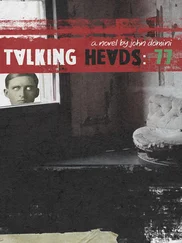When Barbara cast her eyes up, the stony heights tweaked her knees with vertigo. ‘You remember I worked with broken families, Father? I never got the credentials for actual counseling, but I’ve done some good for families. For children.”
“But the effort Christ calls you to here in Naples, signora, requires no greater credential than a caring heart.”
She went on staring at the ceiling, her head on the back of the pew.
“A caring heart, Mrs. Lulucita.” The afternoon sun had sunk low enough to fill the stained-glass windows, and Cesare had leaned into a patch of these airborne colors. “When you adopted that girl, that time, what did you require, except—?”
“The adoption failed.” Barbara sat up and heaved to her feet. “If you ask me, I required a whole lot more.”
“Be that as it may, our clandestini brothers and sisters are lost children too.” Cesare moved with her, the kaleidoscopic glimmer shifting down his robe. He asked whether Barbara knew that some of these outcasts had started a hunger strike.
“A hunger strike?”
“Mrs. Lulucita, what did you expect, coming to Naples? Better pizza? Kisses under the Moorish wall?”
“Moorish? A Moorish — what?”
But the old Jesuit appeared to think the conversation was over. Unfolding from the pew, he broke into an unexpected smile, wrinkle-lifting. He declared that she and her family too were “strangers at the door, don’t you know.” The culture might be different, he said, the skin color, “but Christ’s challenge remains the same.”
She had to laugh, and hearing herself, was surprised at the pleasure in it. You would’ve thought they’d had a reassuring heart-to-heart. Then back outside in the siesta quiet, the odor of volcano, Barb reconsidered the man. The old curmudgeon. He’d been forged by the preaching of John XXIII, the liberation theology and new liturgy, and he’d been taking shots at the bourgeois since he’d first heard a call.
Yet she was confused, no point denying, out under the maples blotched by a constant exposure to diesel exhaust. Estranged and confused, she stood dappled with shadow. Yet she’d found her Duomo, the place that afforded the shiver she needed. At Cesare’s she’d felt her spirit flex, a muscle tremor hard to place but easy to recognize, if you’re a believer. She couldn’t say whether she’d chosen her church and her priest or they’d chosen her, but either way she’d been out of parochial school long enough to know that the movements of faith didn’t always follow the syllabus — that confusion often played a part.
A car shrieked to a stop behind her. Naples traffic, typical.
It might be in keeping with her soul’s exercise, she told herself, it might help strengthen her for life outside marriage to end the moping around and instead try something like Cesare suggested.…
Doors were slammed, above a couple of rough shouts, a man’s voice. Barbara didn’t give it a thought until one of the policemen took her arm. Carabinieri , this guy, not city police. He and the one with him wore braided hats and uniforms, like U.S. state troopers. They shuttled her into their sedan so expertly that at first Barbara had to marvel at it, Italian efficiency and a wide back seat. But then she recalled her kids. The thought branched at once down to the pit of her gut, spiky and cold. She couldn’t be bothered with a seatbelt; she started shouting.
“Sono sicuri . Safe, safe.” This was the officer in the passenger seat, shouting back. “Tutti sicuri.”
Barbara got her first decent look at the policemen, a handsome young duo. The one riding shotgun had lips as fine as John Junior’s. Then by the time the mother could confirm that the problem had to do with her husband, not her children, she could see John Junior himself. The oldest, along with the other four, were in the precinct house. They were two minutes from the church, in a drab suite of offices that overlooked the funicular.
The kids had been put in some sort of holding cell, fronted by a broad window. It seemed to take longer to unlock the door than to drive here from the church. Barb could see at once, anyway, that they didn’t share her anxiety. When she at last got into the cell, into the child-sweat, none of them made a fuss. The girls remained cross-legged on the linoleum floor, talking across a soccer ball. Paul and the two oldest had the three chairs in the room, and they’d set themselves in a row in front of the room’s big window. Only the willowy eleven-year-old turned from the glass as Mom walked in, and then only for a glance. Barbara wound up checking the window herself. From this side, it turned out to be a mirror.
What was a mother supposed to do in here? “Your Pop’s going to be fine,” she said. “On the way over the cops told me it’s not really a kidnapping. They told me it was more like a standoff”
John Junior didn’t need the explanation. “They might take all of us out to the Center next.”
“That’s the way it works,” Chris said. “They bring the family if they think it’ll help negotiations.”
“That’s what they tell you,” JJ said. “That’s what they tell you, Crisco. But actually the plan is to give you to the bad guys instead.”
“Uh-huh. Well you notice nobody’s even talking about giving them you.”
The boys were looking forward to the trip. Why had dumb old Mom and Pop dragged them off to a disaster area like this if it weren’t going to be an adventure?
“E un ostaggio, signore Jay.” This came from a trooper who’d moved into the holding cell with them. The scent of his gun oil cut through the closeness.
“Che brutti, ipoveri.”
Barb looked up at their new protector, his uniform piping and chest strap. She concentrated on the translation: apparently the brutes, the poor out at Jay’s Center, had made a move on the big American. As soon as the news had come from the camp, the law had rounded up the wife and children. They didn’t want another ostaggio , a hostage; the quake had left desperate animali everywhere, even in this neighborhood.
“Animali, i poveri.”
The next to speak up was Dora, always the more adult of the girls. “Mister, hey. Nobody could possibly hurt our Papa.”
The trooper in the room was the one with the great lips. But the smile he offered appeared so smudged and vacant, it could’ve have been one of the downtown prayer offerings, ten years after it was hung on the chapel wall.
“You don’t know about this family,” Dora said. “You don’t know anything about Mama and Papa and us.”
Barbara worked on her own smile.
“Mama is a very, very good person. You don’t know, she works in a church.”
Barbara stepped over beside the girls and put her fingers in that petal-soft hair. Now Sylvia had taken up the argument. “Mama works with children,” she said. “Some children have been badly abused.”
“Some children have been badly abused. Mama brought home a DVD.”
The two eight-year-olds were possessed by such a dreamlike seriousness that they must have worked these ideas out at bedtime, after the adults had left them alone.
“That’s why we moved to Italy.”
“That’s why we moved. Back in America, sometimes she even yelled at Papa about it. ‘Don’t you care about suffering children?’ she yelled.”
“All right,” Barbara started, “all right now you two…”
“That’s why,” Sylvia said, “Paul was able to bring Papa back from the dead.”
“That’s why no one can ever hurt Papa now,” Dora insisted, raising a finger. “Mama turned Papa into someone like her. Like, a saint.”
Barbara seemed to choke on her objections, like Jay had choked a week ago — the last time he’d come up against the poveri . Once more she looked over her children, first the two big teenagers in primary-color soccer gear, then the two stocky fourth-graders-to-be in crayon-bright jumpers and tees (easy to spot in case they got separated), and last the odd, fragile, not quite adolescent boy in black and white. Paul was staring at the girls, thinking it over. The mother had by no means ignored the boy, these last few days; both she and the Jaybird had sat down with him, their riddle-some middle child. What’s more, both had come away with the same understanding, on one point at least. They agreed that Paul didn’t know what he’d accomplished over his father’s choking body. But Mr. Paul needed better than that; if Mama was a saint, she had to do better.
Читать дальше












